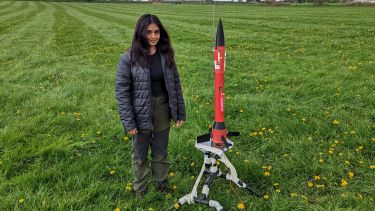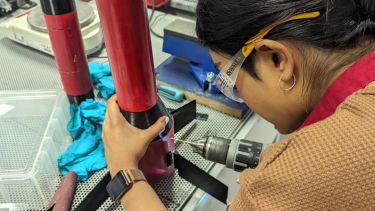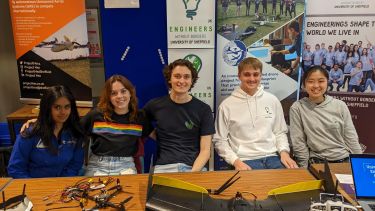To the girls & women dreaming of something like this: strive to learn, to always grow, always be authentic and remember what all the struggle is for

Read: our interview with Kavini
Why did you choose the University of Sheffield to do your degree?
I choose Sheffield after I saw the Engineering YouTube channel and the hands-on approach to learning was something I really appreciated. The student-led projects hugely appealed to me since it had everything I wanted out of an aerospace engineering degree but my entire first year was a major blow to my motivation (an experience I’m sure almost everyone during covid had to suffer through), as I wasn’t allowed to leave my house for eight months. My second year came around, and mentally, I almost treated it as my first year, where I didn’t let myself backdown from any opportunity to get my hands on cool engineering projects that happened within the university.
Why Aerospace?
My deepest motivation to specialise in Aerospace stemmed from seeing what SpaceX could accomplish. I’m fully aware that I'm just one human being, however I’d like to try and contribute to this, even if it’s in the most minute way possible. The second reason is that all of this is just so incredibly awesome! I was sitting in my room in the 38°C heat at night in Dubai desperately awaiting the launch of the Falcon Heavy rocket and a few minutes later I was jumping up and down in disbelief and was eventually brought to tears as the two boosters almost simultaneously landed by themselves exactly on the two landing pads, LZ1 and LZ2, and this is also after they had just shot the Tesla Roaster into space and later, many trips around the Sun.
Tell us about your final year project and why it is so unique?
I would describe my Final Year Project, my ‘crowning glory’ moment of my university journey. I wanted to owe it to my parents, friends and biggest supporter, my amazing boyfriend, Balazs Rigo, who’s also the team lead of another drone team Project Hex. I would also like to mention that there were people I knew who underwhelmed me and said that I couldn’t achieve such things, this almost certainly proved them wrong and I hope to prove them wrong everyday. More importantly, I owed it to myself to be able to achieve my dream of making a rocket and launching it. To all the girls and women dreaming of something like this, strive to learn, to always grow and always be authentic, and remember what all the struggle is for. There will be difficult people, difficult times in your own lives, you owe it to yourself at the end of the day and standing up to these problems is something we should all master when it comes to these kinds of things in life.
I self-proposed my dissertation: 'Developing an Actively-Stabilising Model Rocket’ and Dr.Giuliano Punzo from the Department of Automatic and Control Systems Engineering accepted to supervise this project. I was initially unsatisfied with my control systems knowledge so I purposely proposed a dissertation I knew would challenge me academically.
I can safely say that this was the FIRST-EVER dissertation that involved building and launching a rocket with an active-control element on it, in the history of The University of Sheffield. Designing, building and launching a rocket was already hard enough, but adding an element of control to it really took it a step further. I realised this was quite an ambitious goal, so I had many times where I had to step back to avoid scope creep and avoid delaying the project milestone dates, since I had to work around the Final Year Project submission date.
There were times throughout this dissertation where I did doubt myself and had to step away and put things into perspective, but I’m glad I persevered. I had to review all types of control systems, from very robust control methods like LQR (Linear Quadratic Regulation) to MIMO (Multiple-Input/Output) systems like State Space Control. At the end I settled for a simple but effective method for this application, PID (Proportional Integral Derivative) control. To decide how to physically control this rocket, after conducting some market research and doing a feasibility study of the different types of control methods, I decided to use fins. To avoid this turning into a ballistic missile, I set some base parameters, intentionally made the rocket heavier, since the goal was not to reach an altitude record, it was just to test my control system.
I worked on designing my rocket, as you can see below I really had to think about the mechanical design since this rocket was going to have just one set of fins, for control and not canards since I didn’t want an offset centre of pressure. I eventually got to the manufacturing stage after doing multiple iterations, this was the most satisfying bit, getting to see my months and months of development work behind the scenes coming together.
This is partially what I really enjoy from engineering as well, seeing things you’ve thought of, calculated, and designed, coming to life for a definitive purpose. I developed the entire controller on Simulink and simulated data for what a controlled launch would be like and then I went ahead with the actual launch. It took 4 attempts, but it worked! It stabilised itself on the roll axis as intended.
What does the future hold for you?
I landed a summer internship at a rocket company in the UK called Newton Launch Systems, where I will be developing, building and testing a jetavator with a feedback controller for a 600N thrust rocket engine. I’d like to stay in the UK to pursue a career in space and one day being able to tell people that I worked on a tiny part of an engine of a rocket or wrote a small piece of code on a highly sophisticated control system like those on a Falcon 9, while it launches during a livestream, knowing that it would be leaving Earth to venture the cold, unfathomable vacuum of space, will leave a pretty incredible and awesome feeling in my heart, knowing I’d achieve my vision.
We interviewed Kavini July 2023



